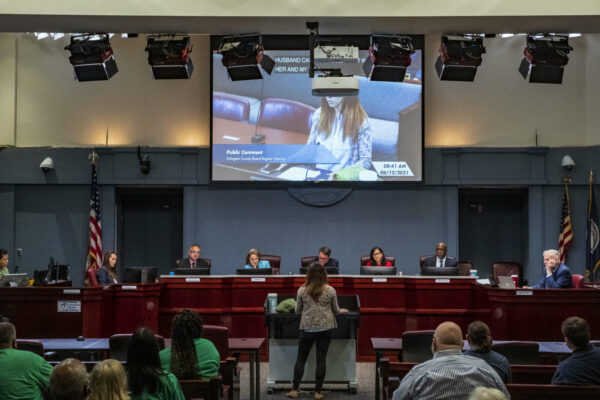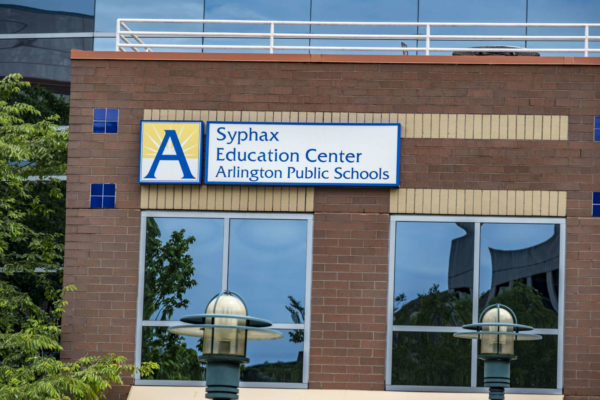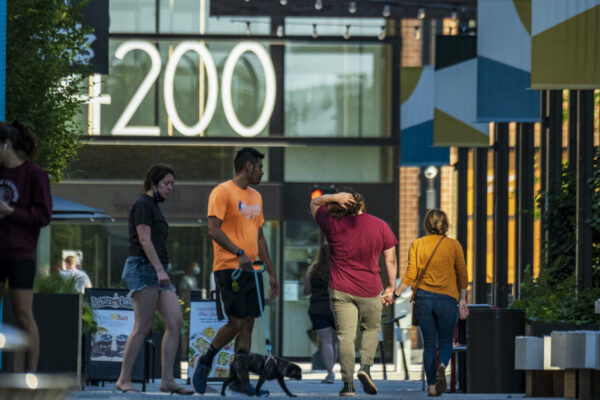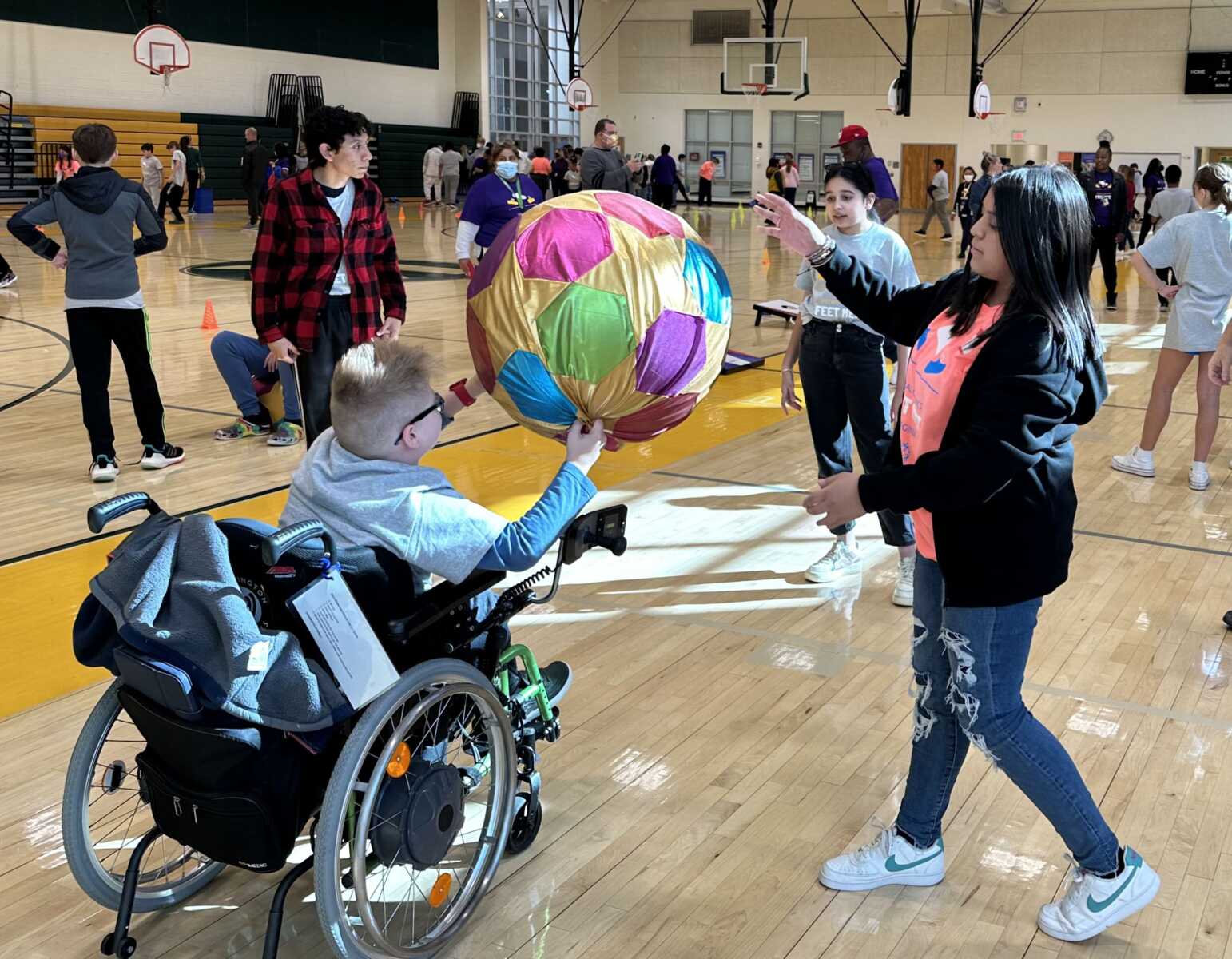
For the last decade, Arlington Public Schools has tried to increase the time students with disabilities spend with their typically abled peers.
Creating a more inclusive environment can benefit students with disabilities and their peers, according to some studies — though not all — as well as new APS academic data. But it is easier said than done.
As of the 2020-21 school year, 67% of students with disabilities spent 80% of their time in the general education setting. The students who make up the difference might spend more time in a small-group setting or they may be placed in county-wide programs.
The 67% figure put APS 5 percentage points below state targets that year and 13 percentage points below a goal it set in its 2018-24 strategic plan.
Progress toward this goal has been sporadic because APS lacked a concrete plan and system-wide buy in to make these changes, according to old APS reports and interviews ARLnow conducted.
“The basic punchline is that they set the goal… and then they didn’t do anything differently for the subsequent five-plus years,” says parent David Rosenblatt, the former chair of Arlington Special Education Advisory Committee. “There was no meaningful plan except goals on paper.”
There are new signs of progress, though.
This year, the Office of Special Education is working with leaders of schools with inclusion rates below 65% to develop goals around increasing inclusion and strategies to help staff with this work, according to APS spokesman Frank Bellvia.
APS is in the early stages of hiring a consultant to devise system-level changes. It issued a request for proposals this summer and is re-issuing a new one this fall.
Previous consultant reports from 2013 and 2019 said Arlington could improve its inclusion efforts but left it to the school system to change. The 2019 report gave APS low marks for its progress since 2013.
APS confirmed its 2024 goal will transfer to future strategic plans.
“Supporting our [students with disabilities] is a core value for the district, and it will take some time to achieve this goal as it involves several factors,” Bellavia said. “Some of these include building an inclusive mindset with staff and within the community, staffing needs, and master schedules at the school.”
What inclusion looks like today
For APS, the good news is that, in 2019, a majority of students receiving services for their disability said they were treated fairly, welcomed in school and able to participate in afterschool activities.
On the other hand, 30% said this was not their experience and 35% said only some or none of their teachers have high expectations for them or “that they don’t know,” per the report.
For special education attorney Juliet Hiznay, students with disabilities can benefit from the higher expectations set in general education classrooms than in separate programs.
“The rationale for [these programs] is that they need a lower ratio, fewer distractions, modified curriculum,” she says. “The problem with that is that we’re looking at supporting a programmatic model rather than taking the student and saying, ‘How do we include her? What is she capable of?’”
Separate tracks may also contribute to fewer general education teachers who receive sufficient training to teach students with disabilities. The 2019 report found only 45% of general education teachers felt equipped to teach this population.
Annually, APS reports to the state how much time students with disabilities spend in with their typically abled peers in general education classrooms, as well as at lunch, recess, study periods, libraries and field trips.
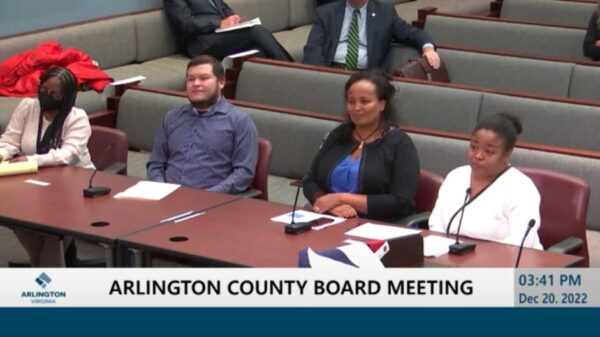
The informal, relationships-based advocacy at the core of the “Arlington Way” makes it harder for nonprofits led by and serving people of color to receive county funding, Arlington County Board Chair Katie Cristol says.
She tells ARLnow these concerns were raised by leaders of color, and she is working on a resolution — that could be voted on by the County Board this month — to change the status quo. The resolution will incorporate recommendations made by a small group of leaders representing local nonprofits.
At the top of their list is a fairly simple concept: a formal application process. Right now, Cristol says, the county uses an “ad hoc” process that doesn’t “live up to our values of transparency and access.”
Meanwhile, a decades-old, community-based program that identifies small infrastructure improvements is confronting a longstanding criticism — which leadership says is backed up by fresh data — of favoring projects in wealthier, whiter neighborhoods.
Community leaders presented updates on these efforts to the Arlington County Board last month. The moves are part of the county’s work to apply its 2019 equity resolution to policy-making and the newest contribution to the Board’s ongoing discussion of problems with the “Arlington Way,” the moniker given to the public process that informs policy-making.
The process often rewards those who are most civically active, connected and vocal about a given issue. But not always: it also frustrates those who follow the civic engagement playbook only to have the Board vote the other way.
“We heard some truthful feedback about how the ‘Arlington Way’ — for the many things it has achieved and its, at times, positive contributions to the community — also has some real downsides,” Cristol said in the Dec. 20, 2022 meeting. “It has been a way of doing things that lacked transparency and access, has prioritized relationships over fairness, and at times, it feels like it is reflective of predetermined outcomes.”
As part of the annual budget, the county awards grants of up to $50,000 or $100,000 for nonprofits serving low- and moderate-income residents, such as employment programs for people with disabilities, after-school programming for immigrant youth and financial planning assistance for families at risk of homelessness.
Leaders of local organizations say the county needs to do a better job of publicizing when funding is available and helping grassroots groups with the application process.
“This part was important for us, particularly for smaller organizations who don’t necessarily have the bandwidth or knowledge in the grant-making cycle that other larger organizations have,” said Cicely Whitfield, the chief program officer for the homeless shelter Bridges to Independence.
This could involve providing clearer deadlines and technical assistance, as well as feedback and workshop opportunities for nonprofits that are denied funding so they can apply successfully.
The group says the county should defer to organizations, which have a better sense of what the community needs, and ask for input on applications from people who would benefit.
Board Member Libby Garvey supported the changes but warned they could be controversial.
“There’s that saying, ‘I’m here from the government and I’m here to help you,’ and that’s supposed to be scary. It’s really because what it often means is, ‘I’m here from the government and I’m here to tell you what you need.'”
The sentiment applies to the Arlington Way, she says.
“We may find a little reaction from this, that ‘This is not the Arlington Way,'” she said. “We’re going to have to figure out ways to bring along everyone and explain… ‘This is going to be better and here’s why.’ We’re going to have work to do with the other part of the community that maybe is usually included.”
There is a three-decade-old program where the county acts on needs identified by residents: the Arlington Neighborhood Conservation Program, now known as the Arlington Neighborhoods Program (ANP).
The downside of this program is that it has “equity liabilities,” County Board Member Takis Karantonis said.
He said the model works for “community members who could afford to go to the meetings, who could afford to make a methodical evaluation of the state of sidewalks, or lack of sidewalks, or lack of public lighting… and fight for funding in a competitive but orderly manner.”
Although not a new criticism, ANP Chair Kathy Reeder provided the County Board with new data suggesting the program has disadvantaged less wealthy, more diverse neighborhoods.
Sponsored by Monday Properties and written by ARLnow, Startup Monday is a weekly column that highlights Arlington-based startups, founders, and local tech news. Monday Properties is proudly featuring 1515 Wilson Blvd in Rosslyn.
Arlington-based CyberVista announced it is providing free cybersecurity training through a new partnership with a D.C. area nonprofit.
The cybersecurity workforce development company located in Rosslyn (1300 17th Street N.) is making available two courses to participants in Black Girls Hack. The Alexandria-based nonprofit provides training and resources to encourage Black girls and women to be engaged in STEM fields, with a focus on cybersecurity and executive suites.
“There is a critical shortage of black women in the cybersecurity industry. BlackGirlsHack’s mission is to bridge this gap by creating a source of shared knowledge and resources that can enable black girls and women to break the barriers,” said BlackGirlsHack Founder and Executive Director Tennisha Martin in a written statement.
For CyberVista, the partnership complements its work to support STEM education.
“Our partnership with Black Girls Hack goes hand-in-hand with CyberVista’s goal to close the skills gap in cybersecurity by measuring and upskilling underrepresented groups of talent,” CyberVista CEO Simone Petrella said. “We support organizations that invest in their communities by elevating STEM education that will enable a better and more diverse cybersecurity workforce.”

Its two courses — Cybersecurity Matters and Security Essentials for IT — are aimed at supplementing the training that BGH provides to current members.
Cybersecurity Matters, which is designed for a non-technical audience, provides foundational knowledge of common cyber attacks and defensive techniques. The company says the course “helps learners understand the ‘hows’ and ‘whys’ of cybersecurity, and their role in keeping the organization secure.”
Security Essentials for IT, designed for information technology professionals, addresses cybersecurity threats related to protecting business data and maintaining business systems.
“We are excited to partner with CyberVista, an organization recognized for making inroads to eliminate the skills gap,” Martin said. “The resources they are providing our members will help us open the doors for more black female professionals in cybersecurity for today and tomorrow.”
CyberVista, founded in 2016, is the sister company of the 85-year-old tutoring and training platform Kaplan. It recently merged with Maryland-based CyberWire, an audio-based cyber media company to form N2K Networks, or “news to knowledge” network, the Washington Business Journal reports.
The new cyber media and education brand has raised a $5.4 million round of funding.
The company that owns Kaplan and CyberVista, Graham Holdings, previously owned the Washington Post.
Flickr photo by wocinthechat
APS Appoints New DEI Chief — “The School Board appointed Dr. Jason Ottley as the new Chief Diversity, Equity and Inclusion Officer at its Oct. 28 School Board meeting. Dr. Ottley has been serving as Interim Chief Diversity, Equity, and Inclusion Officer since Sept. 1.” [Arlington Public Schools]
Ed Center Project Taking Longer — “The firm that has been overseeing construction at the former Arlington Education Center will get another funding bump, as the project lingers longer than expected and requires more oversight. School Board members on Oct. 28 were slated to be briefed on the plan to provide another $277,083 to McDonough Bolyard Peck, which is serving as construction manager adviser on the project. Final approval of the funding is slated for November.” [Sun Gazette]
Time to Compost Your Pumpkins — From Arlington’s Dept. of Environmental Services: “Reincarnation is real. Toss rotting pumpkins in the green curbside cart and they’ll come back to life as nutritious compost.” [Twitter]
Fewer Day Laborers at Shirlington Site — “The users, who live mostly on Columbia Pike and Alexandria, have shrunk to 10-20. ‘The outdoor site is no longer there, and it’s only a matter of time before jobs disappear from there,’ Tobar said.” [Falls Church News-Press]
ANC to Recreate 1921 Procession — “Arlington National Cemetery said Wednesday that it will host a public memorial procession and military flyover on Nov. 11 in honor of the 100th anniversary of the Tomb of Unknowns. The procession, which visitors can observe, will begin at the main entrance to the cemetery on Memorial Avenue near the welcome center.” [Washington Post]
Honor for Wakefield Driving Teacher — “The Virginia Association for Driver Education and Traffic Safety has named Wakefield High School’s Tony Bentley the Behind the Wheel Teacher of the Year. The announcement was made at the state meeting, held online on Oct. 1, which featured 140 driver-education teachers and representatives from the Virginia Department of Education.” [Sun Gazette]
Staff of Rosslyn-Based Politico Unionizes — “The news staffs of Politico and E&E News went public Friday with the news that that they have formed a union. Around 80 percent of the newsrooms’ combined staffs are on board… Politico is based in Virginia, a right-to-work state, so employees will likely have the choice of whether or not to join if the union drive is successful.” [Washingtonian]
It’s Monday, Nov. 1 — The first day of November will be sunny, with a high near 60. Northwest wind 7 to 11 mph. Sunrise at 7:35 a.m. and sunset at 6:07 p.m. Tomorrow there will be a chance of showers. Mostly cloudy, with a high near 53.
Arlington County could use federal American Rescue Plan Act funding to take a swing at making the “Arlington Way” work for more residents.
From what a development project should look like to where protected bike lanes could go, Arlington often invites residents to have a say in policy-making, a local community engagement philosophy known as the “Arlington Way.”
Although it’s a point of pride for the county, officials and staff have acknowledged that these pathways privilege those with the time, resources and connections to invest in discussions about projects, studies and policies — typically older, more affluent residents.
Left out of important county conversations, then, is Arlington’s growing population of renters, parents of young kids, people who work non-traditional hours, people without access to reliable and affordable transportation, and those who are not fluent English speakers.
This is not just a topic Arlington is grappling with. Over in Richmond, the city gave out small stipends to people who participated in updating its citywide master plan. And nationally, compensation has emerged as a “best practice” to “ensure lived experience and community expertise are fairly compensated and publicly recognized,” according to the Urban Institute.
So now, the county is proposing to allocate $50,000 during this fiscal year for a pilot program exploring different ways to make it easier for underrepresented community members to participate in engagement processes through compensation. It would apply to one-time meetings for issues as they arise as well as the longer-term time commitment of an ongoing advisory commission.
“Improving engagement with, and representation in civic structures by, historically underserved communities is a key priority nationally and for Arlington County,” according to a county ARPA spending plan. “Recent Dialogues on Race and Equity surfaced community perspectives that Arlington’s structures for decisions and public input are narrow, advantage dominant perspectives and do not offer access or representation for communities of color to County government leadership.”
Compensation could look like gift cards, childcare and meals, or waived transportation costs. As part of the pilot, the county will collect data on whether these practices increase the diversity of those who participate in government processes.
Championing this cause is Board Vice-Chair Katie Cristol, who told ARLnow earlier this month that there would soon be news about how the county aims to tackle the “Arlington Way.”
“From my perspective, this $50k in ARPA funding is important because it will help catalyze complicated, government-wide conversations about how to reduce barriers for underrepresented Arlingtonians to participate in public processes,” she said. “One of our most challenging issues is the question of how to value time spent, and address obstacles to participation, in our standing advisory bodies.”
She commended the county’s Communications and Public Engagement team for doing “some very exciting work engaging residents in more ad-hoc opportunities,” such as when the county went out to the Lubber Run Community Center to ask kids to sketch out what they’d like to see from a recreation facility.
“But we also do still derive a lot of value from groups, like Commissions, that advise the County over time and can serve as ‘laboratories’ for new ideas; and it’s clearly a lot harder to engage in that kind of ongoing commitment if childcare, transportation, opportunity costs of shift work, etc. are obstacles for you,” she said.
Previously, she said, this has been tested out in Arlington with private funding. When Arlington Partnership for Affordable Housing hosted planning meetings about the future of Columbia Pike, it organized multi-lingual sessions with dinner and childcare provided with funding from an outside grant, she said.
Eventually, the county aims to turn the results of the pilot into “common policies that can be implemented across County departments and projects,” according to the funding plan.
When asked who will oversee the pilot program and when it could be rolled out, as well as who would monitor the money to ensure it gets to the right people and so that it isn’t used to engineer who participates, a county spokeswoman said answers will come when the pilot program kicks off.
“That will all be developed in an implementation plan if/when approved by the county board,” she said.
County Board members are expected to vote on the allocation plan when they meet in November.
(Updated at 4:30 p.m.) Arlington has long prided itself on the pathways available to residents to have a say in local policy-making, also known as the “Arlington Way.”
But a growing number of county officials, local leaders and civic groups think the tradition, while noble in aim, doesn’t work for everyone. They say it leans too much on affluent retirees and sabotages the county’s equity efforts.
For years, Arlington County has acknowledged that its traditional engagement processes privilege those with the time, resources and connections to invest in discussions about projects, studies and policies. That leaves out a growing segment of the population outside that mold: renters, parents of young kids, people who work non-traditional hours, people without access to reliable and affordable transportation, and those who are not fluent English speakers.
Suggestions to retool, reform or scrap the process are not new, but in recent months, the topic has bubbled up in county-level conversations.
References to the “Arlington Way” arose in a County Board public comment period this summer that ran long due to controversy over the start time of a north Arlington farmers market, which shut out participation from low-income residents there to speak about filthy conditions at the Serrano Apartments. More recently, diversity concerns prompted the Arlington County Civic Federation — which provides a forum for civic groups to discuss local topics — to pass a resolution prioritizing improved community outreach and representation.
Amid this renewed focus, some novel approaches and long-term reforms have been proposed that county and civic leaders and community engagement staff tell ARLnow could widen the Arlington Way.
“Generally speaking, Arlington residents care about the issues that impact them, but do they know about it? How do they get the information?” asks Samia Byrd, Arlington’s Chief Race and Equity Officer. “We take for granted that residents know how to participate in the process.”
Board Vice-Chair Katie Cristol reprised the dilemma last week during a conversation about the community oversight board, which is currently seeking members to review cases of alleged police misconduct.
“We’ve been wrestling with… how we properly compensate people for that time and expertise,” Cristol said, as quoted by County Board watcher Stephen Repetski. “Because, frankly, that is… one of the biggest reasons you see our most heavy-hitting community engagement activities tend to rely disproportionately on well-off retirees.”
In a follow-up conversation, she told ARLnow that she’s been thinking about diversity in County Board-appointed commissions.
Six years ago, she believed that the solution would be finding and recruiting new faces at all levels of leadership. Over time, she’s realized the homogeneity of civic leadership is a consequence of how engagement is structured. Night meetings — or even day meetings — at county headquarters disadvantage students, parents and anyone who doesn’t work 9 a.m. to 5 p.m., including overworked young professionals.
“It actually was not just about inviting more diverse people to the table, as defined, but maybe the table was defined in a way that made it hard for certain people to sit there,” she said. “There have to be many ways to engage.”
Those involved in county communications tell ARLnow they likewise think about diversity, not in terms of commission composition and structure, but in terms of regular outreach.
Who’s left out?
Assistant County Manager and Director of Communications and Public Engagement Bryna Helfer has been tackling community engagement homogeneity since she was hired in 2016. She and Byrd both say “it’s been a challenge” to reach people who aren’t white, affluent or a retiree, as well as people who don’t already know how to get involved or navigate the county website.
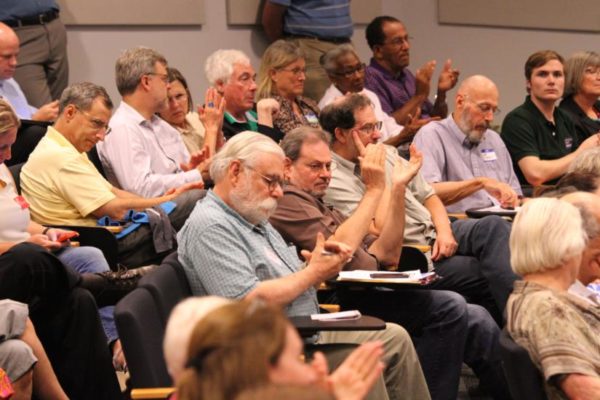
Leaders of a local civic organization admit their membership does not reflect the diversity of Arlington County, but they’re looking to change that.
One of Arlington’s largest community organizations, the Arlington County Civic Federation (CivFed) gives representatives from 85 local groups — including neighborhood civic associations and local advocacy organizations — a non-partisan forum to discuss community topics and provide input on county government and Arlington Public Schools activity.
Generally speaking, however, many delegates are older residents who own homes in North Arlington, and historically, the group has had lower participation from minority groups, younger residents and renters, says CivFed President Allan Gajadhar.
This month the group signaled its commitment to better represent the county by adopting a Diversity, Equity Belonging, and Inclusion resolution. It comes amid ongoing efforts at APS and the county to center racial equity and advance the interests of underserved communities.
In implementing the resolution, Gajadhar says CivFed will focus internally on membership and externally on outreach.
“The representation in the CivFed isn’t fully representative of racial and ethnic and socioeconomic diversity of Arlington,” he said. “There’s definitely a lot more work to be done in the delegate base. That’s not just something that’s going to happen over night. The first thing was to declare our intention to do so — now we are slowly taking steps to evaluate [diversity].”
CivFed, which is nearly 100 years old, aims to bring together and amplify the voices of neighborhood civic associations and organizations such as the local branch of the League of Women Voters. More than 300 delegates vote on resolutions for things on which they want to see the County Board and School Board take action.
CivFed has never formally tallied the demographic diversity of its membership, but it’s not a stretch to say a fair number of delegates are older, wealthier retirees, Gajadhar said.
“It’s been mentioned more than once that the delegate population could be more diverse,” Gajadhar said. “We do have a fair amount of representation from the communities you’d expect.”
CivFed is examining how it can include more young people, people from different racial and ethnic backgrounds, women and renters in its ranks. It is also looking to diversify who holds leadership positions and how information gets communicated. In addition, the resolution made commitments to giving members multicultural competency training, collecting data on community participation, and holding events that engage diverse communities.
Gajadhar, now in his second term, says diversity and equity have been themes during his presidency. He oversaw the launch of a diversity committee, which put forward the resolution.
After the resolution passed with a 94.4% approval rate earlier this month, CivFed surveyed its members to see how they evaluate the diversity of their groups.
The survey is important, Gajadhar says, because CivFed is only as representative as its constituent organizations and realizing the aims of the resolution depends on whether the member groups are equally committed to the stated goals.
“A lot of people don’t necessarily think of the issues that are identified in the resolution as issues,” he said. “We have to be sensitive to who our membership is. We can’t come in with a very strong, forceful mandate or anything like that… We have to go about it carefully — otherwise it’ll be counterproductive.”
Less than two weeks after announcing to Arlington Public Schools employees that its Chief Diversity, Equity and Inclusion Officer was on leave, the school system has posted a job listing for the position.
ARLnow first reported that Dr. Arron Gregory was on “approved leave” to start the school year. Newly-hired Director of Diversity, Equity and Inclusion Dr. Jason Ottley is filling in for Gregory on an interim basis, an APS spokesman said.
As of Thursday afternoon, Gregory’s position — which was created in 2019 and which reports directly to the superintendent — was being advertised as open.
“Human Resources announces an opening for the position of Chief Diversity, Equity and Inclusion Officer,” the job ad says. The position “is responsible for District-wide initiatives and programs that promote instructional equity, create diverse and inclusive environments for employees and students to ensure equal opportunity for academic success across APS. Areas of focus include the recruitment and retention of employees from diverse backgrounds (broadly defined) as well as eliminating opportunity gaps for students at all levels.”
APS spokesman Frank Bellavia confirmed to ARLnow that the school system is now hiring for the position. No explanation for Dr. Gregory’s leave or apparent departure was given. It appears to have been sudden, with Gregory saying via his official Twitter account at the beginning of August that he was looking forward to a DEI staff retreat “in a few weeks.”
Separately, Bellavia also confirmed that APS is hiring a new head of human resources to replace the retiring Dan Redding.
A job ad for the open Assistant Superintendent for Human Resources position was posted on Aug. 11.
“Dan announced his retirement a while ago to relocate with his family,” Bellavia said. Asked about the timing, at the beginning of the school year, he responded that “retirements happen at all times of the year.”
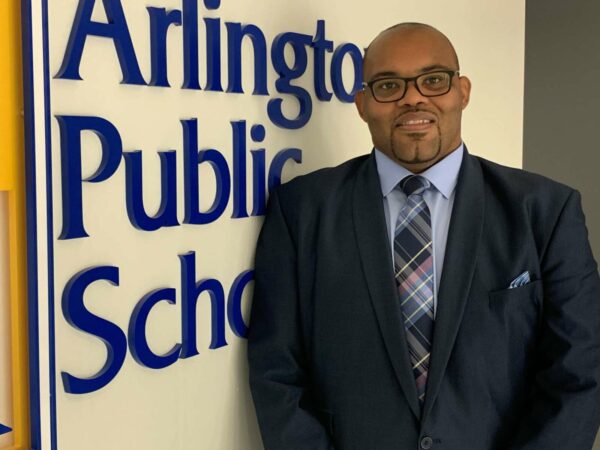
The virtual learning staffing shortfall is not the only issue facing Arlington Public Schools. APS is also starting the school year without its Chief Diversity, Equity and Inclusion Officer.
Dr. Arron Gregory, who was appointed to the then-newly-created position in December 2019, is currently on “approved leave,” APS spokesman Frank Bellavia confirmed to ARLnow. He has been on leave since at least last week, as the new school year got underway.
No further explanation for the leave was given, nor is there any word on how long Gregory might remain on leave.
“I have no additional details,” said Bellavia.
In Gregory’s place, Dr. Jason Ottley, the newly-appointed Director of Diversity, Equity and Inclusion for APS, is assuming the top DEI job — which reports directly to Superintendent Dr. Francisco Durán — on an interim basis, according to a staff memo obtained by ARLnow.
The full memo, sent on Tuesday, August 31, is below.
Dear APS Staff,
I am writing to inform you that Dr. Arron Gregory, Chief Diversity, Equity and Inclusion Officer, is currently on approved leave from Arlington Public Schools. In the meantime, I am pleased to announce that Dr. Jason Ottley, the newly appointed Director of Diversity, Equity and Inclusion, will step into this role temporarily as Interim. Dr. Ottley will assume this position on Wednesday, September 1, 2021, and will help advance the priorities of the office.
Dr. Ottley has been a teacher, school-based administrator and has worked in higher education as faculty and administration. His body of work demonstrates a commitment to data-informed practice, and he has experience with equity audits and policy reform. Please join me in welcoming Dr. Ottley as he assumes this interim role.
Thank you.
Dr. John Mayo
Chief Operating Officer
A 2020 podcast episode on education reform described Ottley as a race scholar and founder of The Bond Educational Group, “which strives to promote greater inclusivity and representation through the American education system and entrepreneurship.”
A D.C. area native, Ottley received his doctorate in 2018 from West Virginia University and has been focused on finding ways to promote student advancement in underserved communities while also boosting minority representation among teachers, according to the podcast. He has also taught at American University.
Before joining APS, Gregory served as Director of Diversity, Equity and Inclusion for the school district in Trotwood, Ohio.
“Gregory brings over 18 years of experience in education with the Ohio Department of Education (ODE) including the Educational Service Center of Central Ohio,” APS said in a press release when he was appointed. “His responsibilities included leading the development and implementation of proactive diversity, equity, and inclusion initiatives, which support the APS strategic plan.”
Arlington is denser and more diverse than it was 10 years ago, according to recently-released 2020 Census data.
The population living within the county’s 26 square miles now sits at 238,643 — a 14.9% increase over 2010, when 207,627 people called Arlington home. That outpaced the rate of population growth for Virginia and the U.S. as a whole, at 7.9% and 7.4%, respectively.
Meanwhile, the county is more diverse today than it was a decade ago: Arlington’s white population declined by 3,677 people, while the number of Hispanic or Latino, Black, Asian, multiracial and indigenous people all increased. That decade-long change reflects a similar change occurring across the nation that was the subject of a flurry of reports last week.
Now that the data is in, county staff will be reviewing the numbers to see what they mean for Arlington, said Bryna Helfer, the assistant county manager for communications and public engagement. Census data helps the county plan for future needs and services, such as emergency services, schools and transportation, while the federal government uses the demographic information to apportion funding to localities.
“Arlington’s team of demographers in Community Planning and Housing Development will be taking time over the coming weeks and months to learn more about the 2020 Census Data and what it means for Arlington,” Helfer said. “We want to thank the entire community for their participation in the 2020 Census.”
Arlington is the eighth most-populous jurisdiction within the Commonwealth, but among counties in Northern Virginia, Arlington has the smallest population, behind Fairfax, Prince William and Loudoun counties. It is growing faster than Fairfax County and D.C. but slower than Loudoun and Prince William counties.
Today the @uscensusbureau released population data.
Alexandria’s population is 159,467 and grew 13.9% over the decade
VA up 7.9%
Loudoun up 34.8%
Prince William up 20%
Arlington up 14.9%
Fairfax County up 6.3%
DC up 14.6%
Montgomery County up 9.3%
Prince George's up 12%— Justin Wilson (@justindotnet) August 12, 2021
Much of Arlington’s growth appears to be concentrated in Metro corridors — part of the county’s goal of “smart growth” around transit areas.
One census tract within Ballston appears to have the highest density not only in Arlington, but in the D.C. area, attaining a population density similar to parts of New York City. It comes in at 96,758 people per square mile, comparable to the Upper West Side of Manhattan.
Overall, Arlington has a population of about 9,180 people per square mile.
Behold the four corners at the center of the Washington region's most densely populated census tract: https://t.co/5CBuPUQ1Il pic.twitter.com/Uggzm4c9sq
— Eric Fidler (@EricFidler) August 12, 2021
As the population grew, 13,000 housing units came online in the county. Despite the housing growth, only a handful of census tracts across the county reported fewer than 90% of their housing units as occupied. On average, Arlington has a housing unit vacancy rate of 7.7%.
While that is lower than the state’s vacancy rate of 8.2%, Arlington has a higher vacancy rate than its neighbors — Fairfax, Loudoun and Prince William counties — which have rates between 3 and 3.8%.
Like many other parts of the nation, the snapshot of Arlington in 2020 was more diverse than 10 years ago. It dropped from being 71.7% white in 2010 to being 61% white in 2020.
The most dramatic increase was in the number of people who identify as multiracial: This population group increased by 18,101 people, or by 233%, and now comprises 10.8% of the population. Following behind them, Asians also leaped in representation, due to a 7,512-person increase. Asians now comprise 11.5% of the population, up from 9.6% in 2010.
Although the Black population increased by 3,243 people (18.4%), Black residents still comprise roughly the same percentage of the population, from 8.5% in 2010 to 8.7% in 2020.
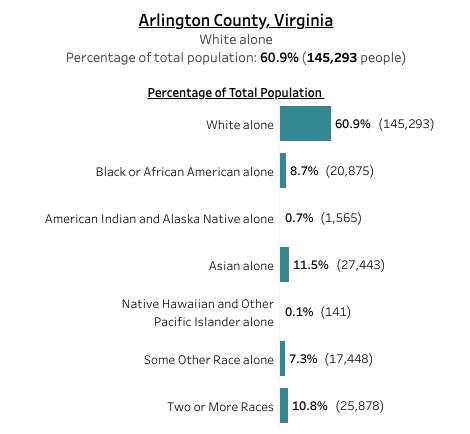
The Hispanic or Latino population also made some gains — an increase of 5,980 people, or 0.6 percentage points.

Pentagon City Suspect Charged With Murder — “Taya Ashton, 20, was found shot to death at an apartment in the 2300 block of Brooks Drive in Suitland on Saturday night, Prince George’s County police said. A day after her slaying, Arlington County police arrested DeAllen Price, of District Heights, for running from officers and going on the Metro tracks at the Pentagon City station, police said… Metro Transit Police and a K9 officer searched the tracks and found a weapon they later linked to Ashton’s murder, police said.” [NBC 4]
Gunston Bubble Going Bye-Bye — “The iconic, yet temperamental, sports ‘bubble’ adjacent to Gunston Middle School will soon be replaced by a barn-like framed structure that will provide more reliability and accessibility, Arlington government officials said. County Board members have approved a contract worth up to $866,800 for installation of the new Clear Span frame-supported fabric structure, which had been purchased previously.” [Sun Gazette]
WeWork, WeLive No Longer Together — “WeWork has washed its hands of WeLive, the co-living brand it launched a half-decade ago with grand aspirations. WeWork handed over management of the two WeLive locations, in Northern Virginia’s Crystal City neighborhood and on Wall Street in Manhattan, to the owners of the buildings, JBG Smith and Rudin Management, a WeWork spokesperson confirmed to Bisnow Wednesday.” [Bisnow]
Cunningham Tapped as AHC’s Interim CEO — “The affordable-housing provider AHC Inc. has tapped Arlington civic leader [and former Arlington County Board candidate] Susan Cunningham as its interim CEO. Cunningham will bridge the gap left by the departure of long-term organization leader Walter Webdale.” [Sun Gazette]
Interview with APS DEI Chief — “We sat down with Arlington Public Schools Chief Diversity, Equity and Inclusion Officer Arron Gregory to talk about the importance of roles like his in schools… How is the school system’s success in these matters ultimately measured? ‘… if we’re unable to predict student success by identities, such as race, class, gender, socioeconomic status, then we’ve achieved educational equity, but if we’re able to predict those outcomes, then there’s work that still needs to happen.'” [WJLA]
Editorial Lauds Lee Highway Renaming — “The symbolism that attends the struggle for racial justice and recognition could hardly be better served than by paying tribute, as the newly named roadway does, to John M. Langston, a man who, in the words of his biographer, ‘was Obama before Obama.’ A century and a half before, as it happens.” [Washington Post]




